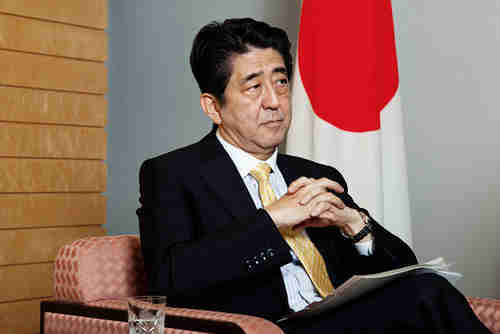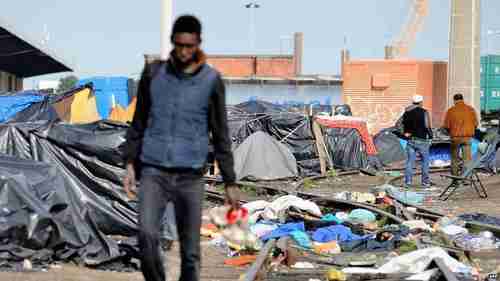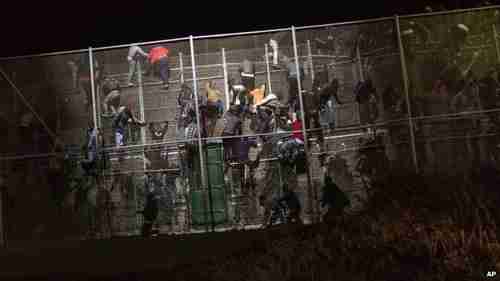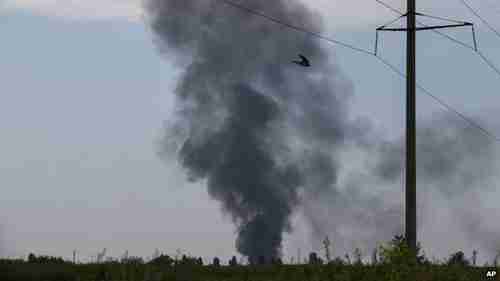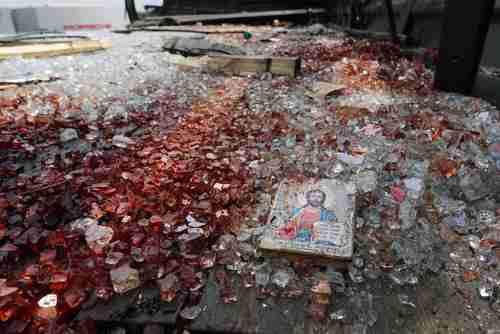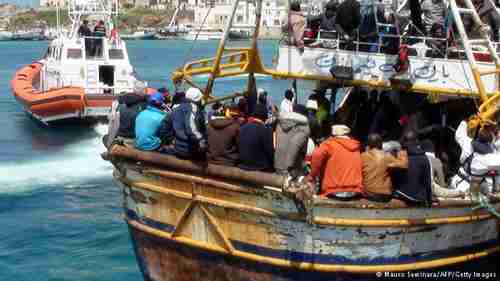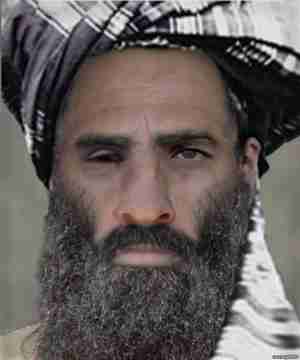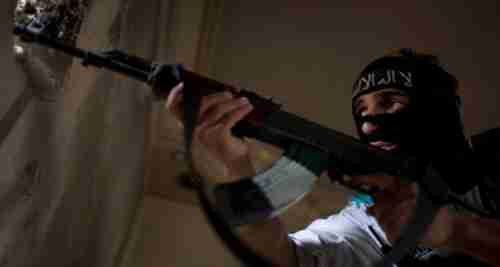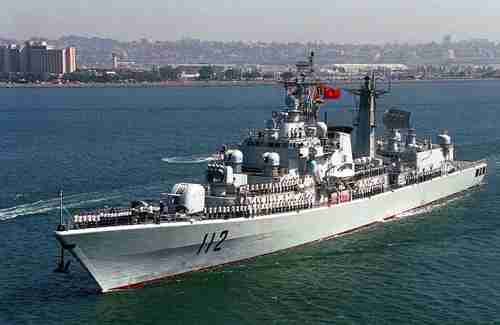*** 7-Jun-14 World View -- Pentagon issues annual report on China's military
This morning's key headlines from GenerationalDynamics.com
- Pentagon issues annual report on China's military
- Al-Sisi's election as Egypt's president tainted by low turnout
- Former ambassador to Syria harshly criticizes Obama's policies
****
**** Pentagon issues annual report on China's military
****
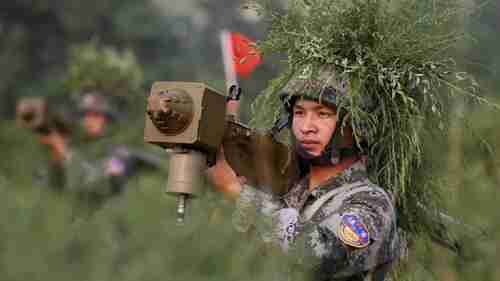
Chinese soldier in live-fire air defense exercise in 2010 (AP)
China is developing a new long-range intercontinental ballistic
missile with multiple nuclear warheads as part of a large-scale
military buildup, according to the "Annual Report to Congress:
Military and Security Developments Involving the People's Republic of
China."
The so-called MIRV (multiple independently targetable re-entry
vehicles) missile will carry with it up to ten additional missiles
with nuclear warheads, so that a single MIRV missile can strike up to
ten different targets with nuclear missiles. China is developing
these MIRV weapons in order to be able to overwhelm U.S. missile
defenses in a war against the United States.
China has deployed a number of nuclear missile systems, including
missiles that can be launched from submarines or from land, and which
are specifically designed to target American cities, military bases
and aircraft carriers.
China has also deployed thousands of short and medium range missiles
for use in striking Vietnam, the Philippines, Japan, or any other
nation that challenges its annexation of other countries' sovereign
regions in the South and East China Seas.
According to the report, China "is investing heavily in its ground
force, emphasizing the ability to deploy campaign-level forces across
long distances quickly. This modernization is playing out with
wide-scale restructuring of PLA ground forces that includes a more
rapid, flexible special operations force equipped with advanced
technology; improved army aviation units using helicopters armed with
precision- guided munitions; and C2 capabilities with improved
networks providing real-time data sharing within and between units."
These capabilities will be used in attacks on China's neighbors,
including Taiwan, and potentially for introducing ground forces into a
United States crippled by a barrage of missile attacks.
According to the report's summary:
<QUOTE>"Although the dialogue between the United States and
China is improving, outstanding questions remain about the rate of
growth in China's military expenditures due to the lack of
transparency regarding China's intentions. In 2013, China
announced a 5.7 percent increase in its annual military budget to
$119.5 billion, continuing more than two decades of sustained
annual defense spending increases. China sustained its investments
in strategic forces modernization, as well as key anti-access /
area-denial (A2/AD) capabilities such as advanced intermediate-
and medium-range conventional ballistic missiles, long-range
land-attack and anti-ship cruise missiles, counter-space weapons,
and offensive cyber capabilities. China's military investments
provide it with a growing ability to project power at increasingly
longer ranges."<END QUOTE>
The Obama administration has gone out of its way to avoid portraying
China as an enemy, but according to one expert on China's military:
<QUOTE>"The 2014 Pentagon PLA report has come a long way to
presenting a more useful listing of China’s military direction.
But it is now time for this report to take the next step. It
needs to become an illustrated book translated into multiple
languages. This document defines the Chinese military’s trajectory
more than any other statement by any other country — which is why
the Chinese government hates it and wants to shut it
down."<END QUOTE>
Indeed, China very bitterly denounced the Pentagon report. According
to China's Foreign Ministry, China has always adhered to the path of
peaceful development, pursued a defense policy which is defensive in
nature and become a staunch force in safeguarding peace and stability
in Asia-Pacific region and the world:
<QUOTE>"China's military buildup is completely aimed at
safeguarding the country's independence, sovereignty and
territorial integrity and is part of the country's justified
rights."<END QUOTE>
As we see more and more in the South China Sea, China's view of
adhering to "peaceful development" is to annex other nation's
territories, and by "safeguarding peace and stability" it means that
anyone who does not do as China demands gets killed. U.S. Dept. of Defense and Free Beacon and Xinhua (Beijing)
****
**** Al-Sisi's election as Egypt's president tainted by low turnout
****
A year ago, army chief Abdel al-Fattah al-Sisi staged a coup and
overthrew Mohamed Morsi, the only democratically elected president in
Egypt's history, along with his Muslim Brotherhood government. After
leaving the army, al-Sisi won his own election to president on May 28,
with a landslide 96.9% of the vote. In contrast to Morsi's elections,
many observers consider al-Sisi's election to be fraudulent, since
thousands of Muslim Brotherhood supporters have been killed or jailed,
and in fact anyone who advocated voting against al-Sisi risked being
beaten or jailed.
Now al-Sisi's opponents are calling the election a fiasco because of
low voter turnout. The government is claiming 47.5% voter turnout,
but it was obviously from live pictures carried by BBC and CNN of
deserted polling places on election day that this figure is way too
high. The Muslim Brotherhood is gleefully claiming that turnout was
no higher than 12%, based on data that they collected on election day.
Egyptian authorities took many desperate measures to increase
the voter turnout, after the low turnout on the first day of
the election. The election had been scheduled to run two days,
but it was extended to a third day. A national holiday was
declared, and popular artists recorded songs for YouTube
encouraging people to vote.
Just as anyone who disagrees with President Obama's policies
is labeled a "racist," the pro-al-Sisi media is blaming
"terrorists" in the Muslim Brotherhood for preventing
people from voting.
However, others in the pro-al-Sisi media are blaming al-Sisi
himself:
- His failure to set out a proper election platform;
- His failure to actually venture out among the people during his
campaign; - His suppression of revolutionary youth movements, such as the
April 6 Movement that he outlawed; - His implementation of policies that contradict the people's
demands and their aspirations to democracy; - The reemergence of associates on the political landscape of former
dictator Hosni Mubarak - A poorly timed end to subsidies and an increase in prices;
- And the reemergence of the use of the media for spreading
pro-Al-Sisi propaganda.
According to one columnist:
<QUOTE>"At this time, many young people are prosecuted,
thrown in prison, and heavily fined [under the regime's protest
law]. It is astonishing that after this, the current Mubarak-esque
government expects these young people – the nation's work force –
to labor, to produce, and to vote..."<END QUOTE>
Another columnist pointed out:
<QUOTE>"Field Marshall 'Abd Al-Fatah Al-Sisi must realize –
and I believe he does – that his job, his aspirations, and his
political dimensions are completely different now than they were
before the election. He must realize that the popular rage is much
greater than [just] that of the MB, and that the attempts to
excuse every crisis by [blaming] terrorism in order to cover up
political incompetence will no longer be convincing to the
millions of Egyptian citizens."<END QUOTE>
Memri
****
**** Former ambassador to Syria harshly criticizes Obama's policies
****
Robert Ford served for three years as President Obama's ambassador to
Syria, before resigning two months ago. Now he's saying that the
reason he resigned is that he could no longer defend the
U.S. administrations policies with respect to Syria. According to
Ford:
<QUOTE>"We need - and we have long needed - to help moderates
in the Syrian opposition with both weapons and other non-lethal
assistance.
Had we done that a couple of years ago, had we ramped it up,
frankly the al Qaeda groups that have been winning adherents would
have been unable to compete with the moderates who frankly we have
much in common with.
[While Russia and especially Iran are massively increasing their
assistance to Assad,] our policy was not evolving and finally I
got to a point where I could no longer defend it
publicly."<END QUOTE>
In an interview on BBC on Friday, Ford explained that President
Obama's policies have permitted al-Qaeda linked jihadists to gain
strength in Syria. Ford was particularly critical of Obama's
flip-flop last year, when Syria's president Bashar al-Assad crossed
Obama's "red line" and used sarin gas to kill people, and Obama did
nothing about it after saying that al-Assad would "face consequences."
According to Ford, moderate opposition Syrians were so angered and
discouraged by Obama's flip-flop that they joined jihadists groups
because that was only possible way they could continue fighting
al-Assad. According to Ford:
<QUOTE>"We need - and we have long needed - to help moderates
in the Syrian opposition with both weapons and other non-lethal
assistance. Had we done that a couple of years ago, had we ramped
it up, frankly the al Qaeda groups that have been winning
adherents would have been unable to compete with the moderates who
frankly we have much in common with."<END QUOTE>
These views will be no surprise to regular World View readers, but
it's unusual for an ambassador to be so critical of a President so
soon after resigning. Reuters and NPR
KEYS: Generational Dynamics, Pentagon, China, MIRV,
Egypt, Muslim Brotherhood, Abdel al-Fattah al-Sisi,
Syria, Bashar al-Assad, Robert Ford, Iran, Russia
Permanent web link to this article
Receive daily World View columns by e-mail


